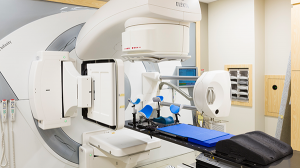Am I a candidate for Stereotactic Body Radiation Therapy (SBRT)?
SBRT is the process where high doses of focused radiation are delivered to the tumour allowing low doses of radiation to adjacent organs such as the bowel or bladder.

Courtesy: Sunnybrook Hospital
The joint decision between you and your doctors to perform SBRT considers several factors and always includes an analysis of the benefits versus the risks to you. These factors include:
- The size and location of the tumour
- Your age.
- The presence of tumours in both your kidneys
- Whether you have only one functioning kidney
- Whether you have other diseases that may affect your kidney function, now or in the future
- Whether you have other diseases that may affect your ability to tolerate SBRT.
SBRT is usually reserved for patients who are not ideal candidates for surgery due to other medical conditions or patients with advanced age because these small tumours grow very slowly. To find out if SBRT is a good option for your treatment plan, use the following questions to have a discussion with your urologist and your radiation oncologist.
What size is my kidney tumour?
SBRT can be considered first for any tumour less than 7 cm. However, larger tumours (between 4 and 7 centimetres) can make it more challenging technically.
Is my tumour in a location in the kidney that is suitable for SBRT?
Do I have other medical conditions that threaten my long-term kidney function?
It is important to preserve the function of your kidneys with SBRT if you have any medical condition that can threaten your future kidney function. Examples of these conditions include diabetes, high blood pressure, kidney stone disease, and chronic kidney disease.
Does my history of previous radiation therapy prevent the use of SBRT in my case?
If you received previous radiation therapy for any reason, your radiation oncologist must review your medical history to determine if SBRT is a suitable option.
TIP: Kidney Cancer Canada recommends before undergoing any radiation therapy, you ask your radiation oncologist specifically if you are a candidate for SBRT and if the treatment you are about to receive will limit your future use of SBRT.
What is my radiation oncologist’s experience with SBRT?
If your radiation oncologist does not have SBRT therapy available at their centre, ask them to send you to another location where SBRT is available for a second opinion.
Do I have tumours present in both of my kidneys?
Having tumours present in both of your kidneys (either at the same time or at subsequent times) is a good example of a time to consider SBRT for one or all the kidney tumours. We recommend that you speak with your doctor about genetic testing.
Do I have multiple tumours in my kidneys?
Having multiple tumours in the kidneys may indicate a hereditary form of kidney cancer.
Do I have only one functioning kidney?
If you only have one functioning kidney then SBRT can be considered.
Does my own diagnosis or a family history suggest a genetic predisposition to kidney cancer?
If your doctor suspects that you may have a genetic tendency towards kidney cancer, you may develop other tumour(s) in the future. In these cases, you should consider treatment or procedure that leaves you with as much kidney function as possible.
Note: SBRT does not necessarily preclude you from subsequent options of surgery or ablation techniques. However, we recommend you discuss all options with your doctors before you undertake any treatment.



























































